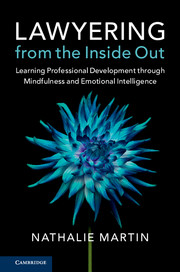 Lawyering from the Inside Out
Lawyering from the Inside Out Book contents
- Frontmatter
- Dedication
- Contents
- List of Figures
- List of Contributors
- Foreword
- Acknowledgments
- Introduction
- PART I NURTURING YOUR BEST SELF
- 1 Gaining Self-Awareness
- 2 Introduction to Mindfulness Techniques
- 3 Managing Energy, Time, and Physical Space for Happy and Healthy Efficiency
- 4 The Lawyer in Society: Popular Culture Images of Lawyers and Your Self-Image
- 5 Lawyer Skill Sets: What We Have, What We Need
- 6 Building Your Professional Identity
- 7 Resilience
- 8 Mindfulness: Theory and Practice
- PART II YOU AND OTHERS AROUND YOU
- PART III YOU AND SOCIETY: FINDING GREATER PURPOSE
- Index
3 - Managing Energy, Time, and Physical Space for Happy and Healthy Efficiency
from PART I - NURTURING YOUR BEST SELF
Published online by Cambridge University Press: 18 May 2018
- Frontmatter
- Dedication
- Contents
- List of Figures
- List of Contributors
- Foreword
- Acknowledgments
- Introduction
- PART I NURTURING YOUR BEST SELF
- 1 Gaining Self-Awareness
- 2 Introduction to Mindfulness Techniques
- 3 Managing Energy, Time, and Physical Space for Happy and Healthy Efficiency
- 4 The Lawyer in Society: Popular Culture Images of Lawyers and Your Self-Image
- 5 Lawyer Skill Sets: What We Have, What We Need
- 6 Building Your Professional Identity
- 7 Resilience
- 8 Mindfulness: Theory and Practice
- PART II YOU AND OTHERS AROUND YOU
- PART III YOU AND SOCIETY: FINDING GREATER PURPOSE
- Index
Summary
Law has become commoditized over the past few decades, meaning it has become much more competitive and like a business. Perhaps it is fitting then that the most recent research on optimal energy for maximum professional productivity comes from the Harvard Business Review. While historically we have focused on “time management” when attempting to become more productive, the modern trend is to focus on managing energy instead. In their article entitled “Managing your Energy Not your Time,” originally published in the Harvard Business Review, authors Tony Schwartz and Catherine McCarthy draw on “four main wellsprings in human beings: the body, emotions, mind, and spirit.”1 We discuss this article and its ramifications for lawyers at some length in this chapter, as well as some other sources. We also discuss traditional time management techniques and productive physical workspaces, all to help you become more efficient, effective, and happy.
INTRODUCTION TO MASTERING OUR ENERGY STORES
Time is Time
We each have a finite amount of time, and time passes even if we do not “use” it. An hour will pass as quickly as an hour passes. We may perceive the flow of time differently based on how we are working (or not), but an hour is still an hour.
How quickly we act or work, or what we get done, is not determined by the hour itself. We are not machines. We don't just go 60 miles per hour, every hour, day by day, month by month, and year by year. How quickly we work, and what we actually get done, depends upon many things, including skill at the required task, available resources, deadlines, motivation, interest, other projects, etc.
No matter what, there are always impediments to working at our best. Sometimes, these impediments do not slow us but at other times, they drag us down. What accounts for this difference? How can we succeed in one instance but not the other, despite the impediments? The answer lies in how much energy we have.
We are Whole Beings
What happens to us one day could affect the next day, even the rest of our lives. Many external or controllable factors can also affect our ability to work, including whether we exercise, eat well, and get enough sleep.
Information
- Type
- Chapter
- Information
- Lawyering from the Inside OutLearning Professional Development through Mindfulness and Emotional Intelligence, pp. 33 - 47Publisher: Cambridge University PressPrint publication year: 2018